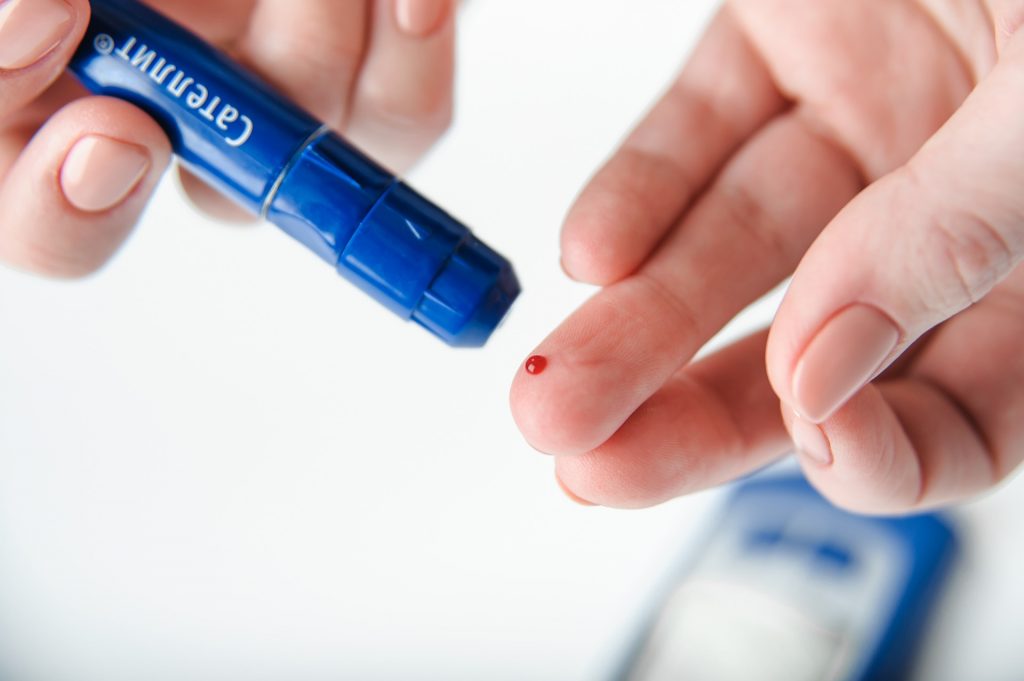Sugar Sensing Pacifier Could Spare Heartache & Pricks
Researchers may have developed a way for parents to avoid having to prick their babies with type 1 to check blood sugar. A sugar sensing pacifier collects saliva, tests the glucose levels, and wirelessly sends result to a receiver which the parent or caregiver can see.

This device was tested on adults first to see if the concept would work. Initial results were positive, showing changes in saliva sugar levels which corresponded to changes in blood sugar levels. Researchers noted that there was great correlation in the study and that they were able to tell when blood glucose was high with great accuracy.
The small parts involved in the pacifier, and the fact that saliva was tested after adults were instructed to brush their teeth (unlikely to be replicated in infants), may be barriers to a patent and this device getting on the market. Researchers are hopeful to find ways to overcome these and be able to offer the market a truly non-invasive option for babies with type 1.
Sign up for Diabetes Blog Bytes – we post one daily Blog Byte from Monday to Friday. And of course, Tuesday is our Question of the Week. It’s Informative and FREE! Sign up below!
[yikes-mailchimp form=”1″]Mindful Monday | One Drop: Expanding the Reach of CDCES’s

A new company called One Drop is helping people self-manage their chronic conditions.
The program connects each participant with a dedicated Certified Diabetes Education Specialist or personal health coach to help them navigate and manage their diabetes.
One Drop offers 3 monthly memberships for either a Digital Membership, a supply membership, or a membership with both.
The Digital Membership includes goal setting, coaching, and tracking your healthcare goal progress. The supply membership includes items like blood glucose meters, a lancing device, 50 test strips, 10 lancets, and a carry case supplied every few months.
One Drop offers some interesting new features on glucose monitors that make it a bit unique in the marketplace. The subscription comes with a free app that provides real-time support from professionals and education on diabetes, prediabetes, high blood pressure, and high cholesterol.
One Drop is helping to give access to people who are not able to physically go and see a health care professional. Another unique feature of the app is it can give you an eight-hour glucose forecast based on your behavior and One Drop’s AI. One Drop’s monitors are now available in Walmart (for $69.95) and at select Apple retail locations.
Read more about it here.
Sign up for Diabetes Blog Bytes – we post one daily Blog Byte from Monday to Friday. And of course, Tuesday is our Question of the Week. It’s Informative and FREE! Sign up below!
[yikes-mailchimp form=”1″]MiniMed Insulin Pumps Could Malfunction on Flights
In July 2019, the U.S. Food and Drug Administration (FDA) issued alerts on Medtronic’s 600-series MiniMed insulin pumps.

It appears that when air pressure changes quickly, such as during take-off or landing, the device’s keypad buttons could temporarily become “unresponsive”.
This means that users may not be able to program a bolus or suspend delivery, since the buttons won’t temporarily press down. However, the basal insulin continues to be delivered.
The good news is that in most cases, when atmospheric pressures normalizes, the buttons will work again in about thirty minutes. Also, pump users can resolve the issue by taking off the battery cap and putting it back on again.
Medtronic is actively working on a long-term hardware solution for this rare situation.
The alerts, classified as a class II recall by the FDA, apply to the MiniMed 620G, 630G, 640G and 670G models. A class II recall is considered medium severity and is used when the probability of a serious adverse consequence is considered remote. The FDA and Medtronic are not requesting any devices be returned, they are just making sure Medtronic pump wearers are aware of this issue.
Read the complete article here.
New Technology Toolkit – Earn 3.0 CEs Premiers August 20 & 23
When it comes to insulin pumps, sensors and calculation, many of us feel overwhelmed and unsure about diabetes technology management. Plus, with the vast amount of information, it may seem impossible to figure out what to focus on for our clinical practice and to prepare for the diabetes certification exam.

Coach Beverly invites you to enroll in our NEW Technology Toolkit Online Course Bundle, to keep you abreast of the rapidly changing world of Insulin Pump Therapy, Continuous Glucose Monitoring and calculations while preparing for exam success.
If you want cutting edge information on diabetes technology, problem solving and using formulas to determine appropriate insulin dosing, we highly recommend this toolkit.
Sign up for Diabetes Blog Bytes – we post one daily Blog Byte from Monday to Friday. And of course, Tuesday is our Question of the Week. It’s Informative and FREE! Sign up below!
[yikes-mailchimp form=”1″]A change of screen culture needed to prevent metabolic syndrome in teens
According to a study presented during the 2019 annual Endocrine Society Meeting, metabolic syndrome in teens may be directly correlated with screen time and eating snacks.

“Metabolic syndrome includes high blood pressure, high blood sugar, excess visceral adiposity and abnormal cholesterol levels. The syndrome increases a person’s risk for heart attack and stroke.”
Screen time is often associated with other negative behaviors such as snacking, eating excessively, and lack of movement.
Researchers found the teens spending 6 or more hours of screen time were more likely to develop metabolic syndrome. The odds were even higher for teens who reported snacking during those hours.
“Eating unhealthy snacks in front of screens is a habit that is probably harmful, but the relationship between this and obesity is well-known, but not with metabolic syndrome.” This research demonstrates that there is a relationship between snacking and metabolic syndrome.
A study of Cardiovascular Risks in Adolescents in Brazil analyzed the data from over 34,000 teens between the ages of 12 and 17. The teens were to write down their screen time habits daily and whether or not they were snacking.
“Snacking while watching TV was reported by 85.1% of the study population, and snacking while playing video games or using the computer was reported by 64%.”
“Strategies to assess and address metabolic syndrome in the pediatric population should aim at limiting unhealthy snacks while in front of screens,” Lead researcher Schaan said.

Shift in community and screen culture needed
Researchers recommend making an intervention on unhealthy habits that form during childhood. However, they believe that there may need to be a bigger shift in community culture.
As healthcare professionals we want to prompt a healthy lifestyle particularly at a young age. The habits we set as adolescents often transfer into adulthood.
To learn more: Metabolic Syndrome more likely in teens who snack while watching TV – Endocrine Today
Sign up for Diabetes Blog Bytes – we post one daily Blog Byte from Monday to Friday. And of course, Tuesday is our Question of the Week. It’s Informative and FREE! Sign up below!
[yikes-mailchimp form=”1″]23andMe launches a predisposition test for Type 2 diabetes
This past March, 23andMe, a personal genomics and biotechnology company announced their latest reporting technology, a test that determines a person’s predisposition to Type 2 diabetes.
The test itself is to help people identify what level of risk they may have in developing Type 2. However, it is not meant to imply that the report actually diagnoses a person with Type 2.

The company has recently partnered with Lark Health, a platform that uses artificial intelligence to help people manage chronic disease. The idea is that 23andMe will help identify the risk of chronic disease through the examination of genetic data. Once you are aware of the risk level, you would then use Lark Health to change lifestyle habits.
The release of this test is significant, as it is the first test that utilizes the data collected to examine risk for disease. “For a company like 23andMe, increasing the number of tests they offer adds a lot of value, and can have a snowball effect: the more data they collect, the more tests they can develop and the more tests they offer the more data they can collect (since new tests will drive new users to the service).”
The rates of Type 2 diabetes continues to increase, affecting 1 in 10 Americans and costing more than $327 billion dollars a year. By informing consumers of their risk of Type 2, 23andMe hopes to help increase prevention efforts.
The announcement of the new risk test was met with some push-back, stating that screening tests are already in place, the difficult part is encouraging someone to actually change their habits and lifestyle to better their health.
23andMe hopes that their evidence-based approach with the widespread qualitative diagnosis of pre-diabetes will help people take the diagnoses more seriously.
With diabetes expected to affect half the population, 23andMe is hoping “When customers learn about their genetic likelihood of developing Type 2 diabetes, we believe there is an opportunity to motivate them to change their lifestyle and ultimately to help them prevent the disease.”
To Learn More: 23andMe launches predisposition test for Type 2 diabetes – mobihealthnews
Sign up for Diabetes Blog Bytes – we post one daily Blog Byte from Monday to Friday. And of course, Tuesday is our Question of the Week. It’s Informative and FREE! Sign up below!
[yikes-mailchimp form=”1″]







